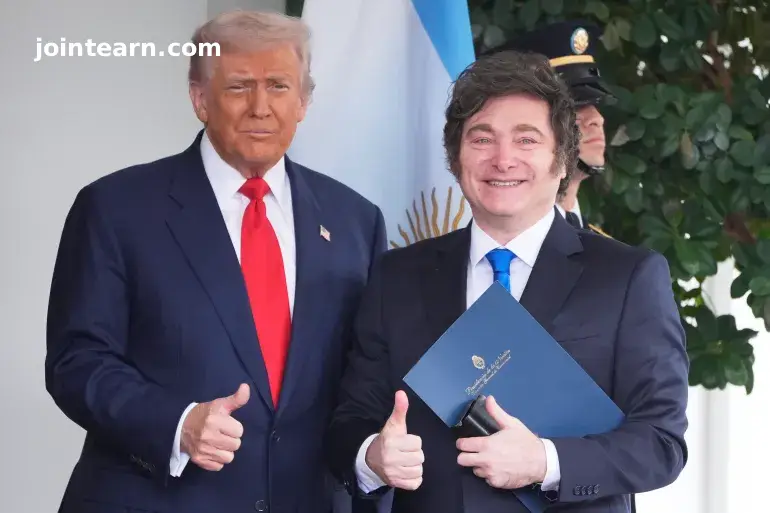
WASHINGTON, D.C. — President Donald Trump’s $20 billion bailout for Argentina has triggered a wave of backlash across America’s agricultural heartland, with soybean farmers accusing the administration of supporting their biggest competitor at a time of domestic economic strain.
The financial package, announced ahead of Argentina’s legislative elections, was meant to stabilize the South American nation’s collapsing peso and support its libertarian president Javier Milei, a close Trump ally. But for US farmers — already reeling from reduced exports due to Trump’s trade war with China — the move feels like a betrayal.
“The frustration is overwhelming,” said Caleb Ragland, president of the American Soybean Association. “We’re losing markets we built for decades, and now taxpayer-backed aid is going to the country taking our customers.”
Trump’s Argentina Rescue: What It Means
The $20 billion bailout, officially a currency swap facility, allows Argentina’s central bank to stabilize its economy by exchanging debt under predetermined terms. The aid, Treasury Secretary Scott Bessent said, represents “support for an ally in crisis” rather than a handout.
However, critics, including Senator Chuck Grassley of Iowa, argue that the optics are damaging.
“Why would the USA help bail out Argentina while they take American soybean producers’ biggest market?” Grassley posted on X (formerly Twitter).
How Argentina’s Farmers Are Outpacing US Producers
Argentina’s soybean farmers have rapidly expanded exports thanks to Milei’s pro-market policies, including the temporary suspension of export tariffs to boost foreign currency reserves. This has allowed Argentina to sell soybeans to China, which has stopped purchasing from the United States amid Trump’s escalating tariffs.
Experts say China immediately bought about 7 million tonnes of soybeans from Argentina and Brazil after the tariffs took effect.
“The South American soybean crop was strong this year and is expected to grow again,” said Chad Hart, agricultural economist at Iowa State University. “China’s needs are being met without the US.”
This dynamic has deepened frustration among American farmers, who see the bailout as indirectly empowering their competition.
The Economic and Political Context
President Javier Milei, who came to power promising to slash government spending and reduce inflation, is one of Trump’s closest ideological allies. Both leaders have promoted a “pro-growth, anti-socialist” agenda.
But with Argentina’s currency in freefall and inflation exceeding 200%, Milei faced mounting pressure ahead of midterm elections. The Trump administration’s bailout was designed to prevent a financial collapse that could topple a friendly government.
“It’s hope for the future,” said Bessent. “With US support, Argentina can be great again.”
Still, Brad Setser of the Council on Foreign Relations warned that “Argentina’s export base is small, its foreign debts are high, and its reserves are low,” cautioning that the bailout may only provide temporary relief.
Domestic Political Fallout in the US
The bailout’s timing has also drawn fire from Democrats, who argue that the administration is prioritizing foreign rescues over domestic healthcare affordability.
Senator Amy Klobuchar of Minnesota and Representative Adam Schiff of California both criticized Trump for approving foreign aid “larger than the subsidies keeping health insurance affordable for millions of Americans.”
Senator Brian Schatz added, “For the cost of the Argentina bailout, we could fund Affordable Care Act tax credits for a full year.”
Farmers Demand Action
The soybean sector, worth billions to the US economy, has already been devastated by declining Chinese demand, mounting farm debt, and stalled federal compensation programs due to government shutdowns.
“We’ve been promised relief for years,” said Todd Hubbs, crop marketing professor at Oklahoma State University. “Instead, we’re watching our markets go to South America while our own aid remains frozen.”
Grassroots movements like the American Soybean Association and regional farmer cooperatives are lobbying Congress to reassess trade policy and tighten agricultural support programs before the 2026 planting season.
Comparing the Costs: Argentina vs. American Health Subsidies
The $20 billion Argentina package mirrors the $24.6 billion annual cost of maintaining Affordable Care Act (ACA) premium subsidies, according to the Congressional Budget Office.
While Treasury officials insist the bailout funds come from the Exchange Stabilization Fund, not taxpayer healthcare accounts, critics say the political symbolism of the move is damaging — especially as health insurance premiums are set to rise over 100% if subsidies expire.
Looking Ahead
US officials have hinted that a second $20 billion extension to Argentina could be approved, potentially with private-sector backing. For America’s farmers, that’s a worrying sign that their trade troubles may deepen further.
“This isn’t just about soybeans,” said Ragland. “It’s about loyalty. We’re watching our leaders bankroll the competition while we lose everything we’ve worked for.”


Leave a Reply